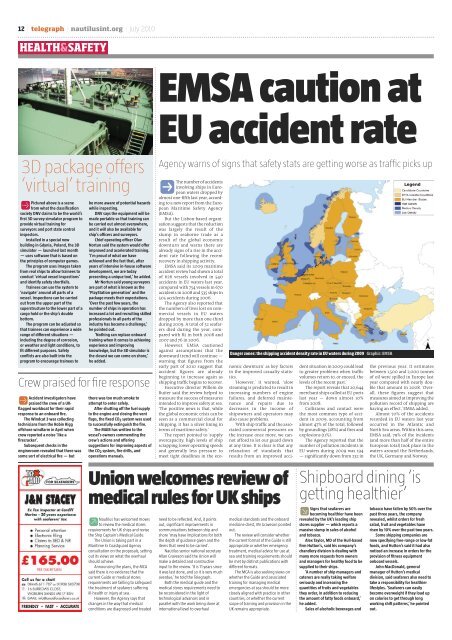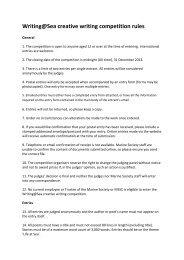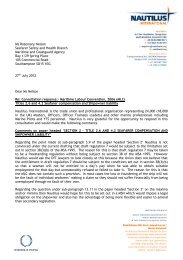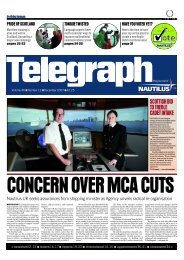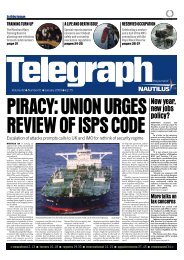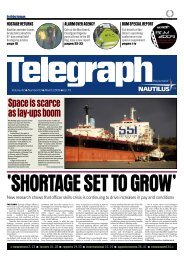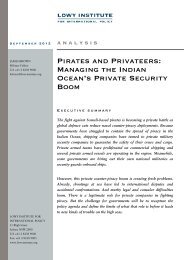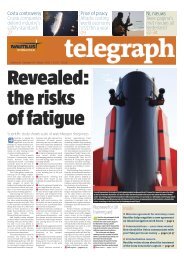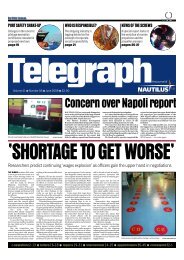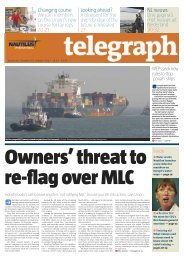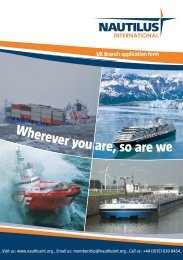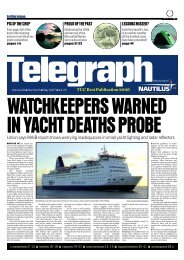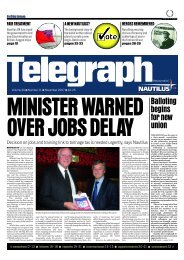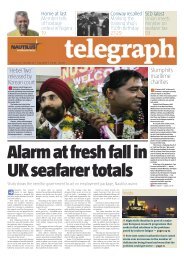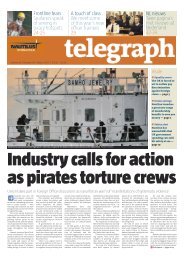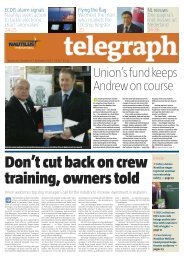Create successful ePaper yourself
Turn your PDF publications into a flip-book with our unique Google optimized e-Paper software.
12 | telegraph | nautilusint.org | July 2010<br />
HEALTH&SAFETY<br />
3D package offers<br />
‘virtual’ training<br />
Pictured above is a scene<br />
Afrom what the classification<br />
society DNV claims to be the world’s<br />
first 3D survey simulator program to<br />
provide virtual training for<br />
surveyors and port state control<br />
inspectors.<br />
Installed in a special new<br />
building in Gdynia, Poland, the 3D<br />
simulator — launched last month<br />
— uses software that is based on<br />
the principles of computer games.<br />
The program uses images taken<br />
from real ships to allow trainees to<br />
conduct ‘virtual vessel inspections’<br />
and identify safety shortfalls.<br />
Trainees can use the system to<br />
‘navigate’ around all parts of a<br />
vessel. Inspections can be carried<br />
out from the upper part of the<br />
superstructure to the lower part of a<br />
cargo hold or the ship’s double<br />
bottom.<br />
The program can be adjusted so<br />
that trainees can experience a wide<br />
range of different situations —<br />
including the degree of corrosion,<br />
or weather and light conditions, to<br />
fit different purposes. Safety<br />
conflicts are also built into the<br />
program to encourage trainees to<br />
be more aware of potential hazards<br />
while inspecting.<br />
DNV says the equipment will be<br />
made portable so that training can<br />
be carried out almost everywhere,<br />
and it will also be available for<br />
ship’s officers and surveyors.<br />
Chief operating officer Olav<br />
Nortun said the system would offer<br />
improved and accelerated training.<br />
‘I’m proud of what we have<br />
achieved and the fact that, after<br />
years of intensive in-house software<br />
development, we are today<br />
presenting a unique tool,’ he added.<br />
Mr Nortun said young surveyors<br />
are part of what is known as the<br />
‘PlayStation generation’ and the<br />
package meets their expectations.<br />
‘Over the past few years, the<br />
number of ships in operation has<br />
increased a lot and recruiting skilled<br />
professionals to all parts of the<br />
industry has become a challenge,’<br />
he pointed out.<br />
‘Nothing can replace onboard<br />
training when it comes to achieving<br />
experience and improving<br />
knowledge, but the 3D simulator is<br />
the closest we can come on shore,’<br />
he added.<br />
Crew praised for fire response<br />
Accident investigators have<br />
Apraised the crew of a UKflagged<br />
workboat for their rapid<br />
response to an onboard fire.<br />
The Windcat 3 was collecting<br />
technicians from the Robin Rigg<br />
offshore windfarm in April when<br />
crew reported a noise ‘like a<br />
firecracker’.<br />
Subsequent checks in the<br />
engineroom revealed that there was<br />
some sort of electrical fire — but<br />
there was too much smoke to<br />
attempt to enter safely.<br />
After shutting off the fuel supply<br />
to the engine and closing the vent<br />
flaps, the fixed CO 2 system was used<br />
to successfully extinguish the fire.<br />
The MAIB has written to the<br />
vessel’s owners commending the<br />
crew’s actions and offering<br />
suggestions for improving aspects of<br />
the CO 2 system, fire drills, and<br />
operations manuals.<br />
<strong>Nautilus</strong> has welcomed moves<br />
Hto review the medical stores<br />
requirements for UK ships and revise<br />
the Ship Captain’s Medical Guide.<br />
The Union is taking part in a<br />
Maritime & Coastguard Agency<br />
consultation on the proposals, setting<br />
out its views on what the overhaul<br />
should achieve.<br />
Announcing the plans, the MCA<br />
said there is no evidence that the<br />
current Guide or medical stores<br />
requirements are failling to safeguard<br />
the treatment of seafarers suffering<br />
ill-health or injury at sea.<br />
However, the Agency says that<br />
changes in the way that medical<br />
conditions are diagnosed and treated<br />
EMSA caution at<br />
EU accident rate<br />
Agency warns of signs that safety stats are getting worse as traffic picks up<br />
need to be reflected. And, it points<br />
out, significant improvements in<br />
communications between ship and<br />
shore ‘may have implications for both<br />
the depth of guidance given and the<br />
items that need to be carried’.<br />
<strong>Nautilus</strong> senior national secretary<br />
Allan Graveson said the Union will<br />
make a detailed and constructive<br />
input to the review. ‘It is 11 years since<br />
it was last done, and so it is very much<br />
overdue,’ he told the Telegraph.<br />
Both the medical guide and the<br />
medical stores requirements need to<br />
be reconsidered in the light of<br />
technological advances and in<br />
parallel with the work being done at<br />
international level to overhaul<br />
Union welcomes review of<br />
medical rules for UK ships<br />
Danger zones: the shipping accident density rate in EU waters during 2009 Graphic: EMSA<br />
medical standards and the onboard<br />
medicine chest, Mr Graveson pointed<br />
out.<br />
The review will consider whether<br />
the current format of the Guide is still<br />
appropriate or whether emergency<br />
treatment, medical advice for use at<br />
sea and training requirements should<br />
be met by distinct publications with<br />
different formats.<br />
The MCA is also seeking views on<br />
whether the Guide and associated<br />
training for managing medical<br />
emergencies at sea should be more<br />
closely aligned with practice in other<br />
countries, or whether the current<br />
scope of training and provision in the<br />
UK remains appropriate.<br />
PThe number of accidents<br />
involving ships in European<br />
waters dropped by<br />
almost one-fifth last year, according<br />
to a new report from the European<br />
Maritime Safety Agency<br />
(EMSA).<br />
But the Lisbon-based organisation<br />
suggests that the reduction<br />
was largely the result of the<br />
slump in seaborne trade as a<br />
result of the global economic<br />
downturn and warns there are<br />
already signs of a rise in the accident<br />
rate following the recent<br />
recovery in shipping activity.<br />
EMSA said its 2009 maritime<br />
accident review had shown a total<br />
of 626 vessels involved in 540<br />
accidents in EU waters last year,<br />
compared with 754 vessels in 670<br />
accidents in 2008 and 535 ships in<br />
505 accidents during 2006.<br />
The Agency also reported that<br />
the numbers of lives lost on commercial<br />
vessels in EU waters<br />
dropped by more than one-third<br />
during 2009. A total of 52 seafarers<br />
died during the year, compared<br />
with 82 in both 2008 and<br />
2007 and 76 in 2006.<br />
However, EMSA cautioned<br />
against assumptions that the<br />
downward trend will continue —<br />
warning that figures from the<br />
early part of 2010 suggest that<br />
accident figures are already<br />
beginning to increase again as<br />
shipping traffic begins to recover.<br />
Executive director Willem de<br />
Ruiter said the review helped to<br />
measure the success of measures<br />
intended to improve safety at sea.<br />
‘The positive news is that, while<br />
the global economic crisis can be<br />
seen as a commercial cloud for<br />
shipping, it has a silver lining in<br />
terms of maritime safety.’<br />
The report pointed to ‘supply<br />
overcapacity, high levels of ship<br />
scrapping, lower operating speeds<br />
and generally less pressure to<br />
meet tight deadlines in the economic<br />
downturn’ as key factors<br />
in the improved casualty statistics.<br />
‘However,’ it warned, ‘slow<br />
steaming is predicted to result in<br />
increasing numbers of engine<br />
failures, and deferred maintenance<br />
and repairs due to<br />
decreases in the income of<br />
shipowners and operators may<br />
also cause problems.<br />
‘With ship traffic and the associated<br />
commercial pressures on<br />
the increase once more, we cannot<br />
afford to let our guard down<br />
at any time. It is clear is that any<br />
relaxation of standards that<br />
results from an improved accident<br />
situation in 2009 could lead<br />
to greater problems when traffic<br />
volumes return to, or exceed, the<br />
levels of the recent past.’<br />
The report reveals that 20,644<br />
merchant ships called at EU ports<br />
last year — down almost 10%<br />
from 2008.<br />
Collisions and contact were<br />
the most common type of accident<br />
in 2009, accounting from<br />
almost 47% of the total, followed<br />
by groundings (28%) and fires and<br />
explosions (11%).<br />
The Agency reported that the<br />
number of pollution incidents in<br />
EU waters during 2009 was 194<br />
— significantly down from 232 in<br />
Signs that seafarers are<br />
Fbecoming healthier have been<br />
revealed by the UK’s leading ship<br />
stores supplier — which reports a<br />
massive slump in sales of alcohol<br />
and tobacco.<br />
Alex Taylor, MD of the Hull-based<br />
firm Hutton’s, said his company’s<br />
chandlery division is dealing with<br />
many more requests from owners<br />
and managers for healthy food to be<br />
supplied to their ships.<br />
‘A number of ship managers and<br />
caterers are really taking welfare<br />
seriously and increasing the<br />
quantities of fruits and vegetables<br />
they order, in addition to reducing<br />
the amount of fatty foods onboard,’<br />
he added.<br />
Sales of alcoholic beverages and<br />
the previous year. It estimates<br />
between 1,500 and 2,000 tonnes<br />
of oil were spilled in Europe last<br />
year compared with nearly double<br />
that amount in 2008. ‘Overall,<br />
these figures suggest that<br />
measures aimed at improving the<br />
pollution record of shipping are<br />
having an effect,’ EMSA added.<br />
Almost 70% of the accidents<br />
recorded in EU waters last year<br />
occurred in the Atlantic and<br />
North Sea areas. Within this area,<br />
EMSA said, 79% of the incidents<br />
(and more than half of the entire<br />
European total) took place in the<br />
waters around the Netherlands,<br />
the UK, Germany and Norway.<br />
Shipboard dining ‘is<br />
getting healthier’<br />
tobacco have fallen by 50% over the<br />
past three years, the company<br />
revealed, whilst orders for fresh<br />
salad, fruit and vegetables have<br />
risen by 10% over the past two years.<br />
Some shipping companies are<br />
now specifying free-range or low-fat<br />
foods, and Hutton’s said it had also<br />
noticed an increase in orders for the<br />
provision of fitness equipment<br />
onboard vessels.<br />
John MacDonald, general<br />
manager of Hutton’s medical<br />
division, said seafarers also need to<br />
take a responsibility for healthier<br />
lifestyles. ‘Seafarers can easily<br />
become overweight if they load up<br />
on calories to get through long<br />
working shift patterns,’ he pointed<br />
out.


